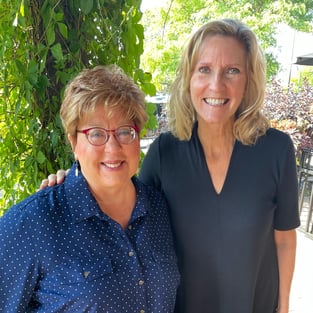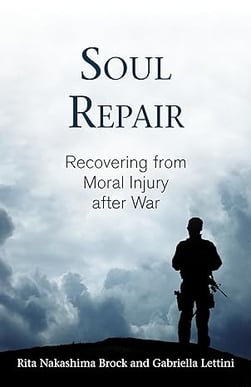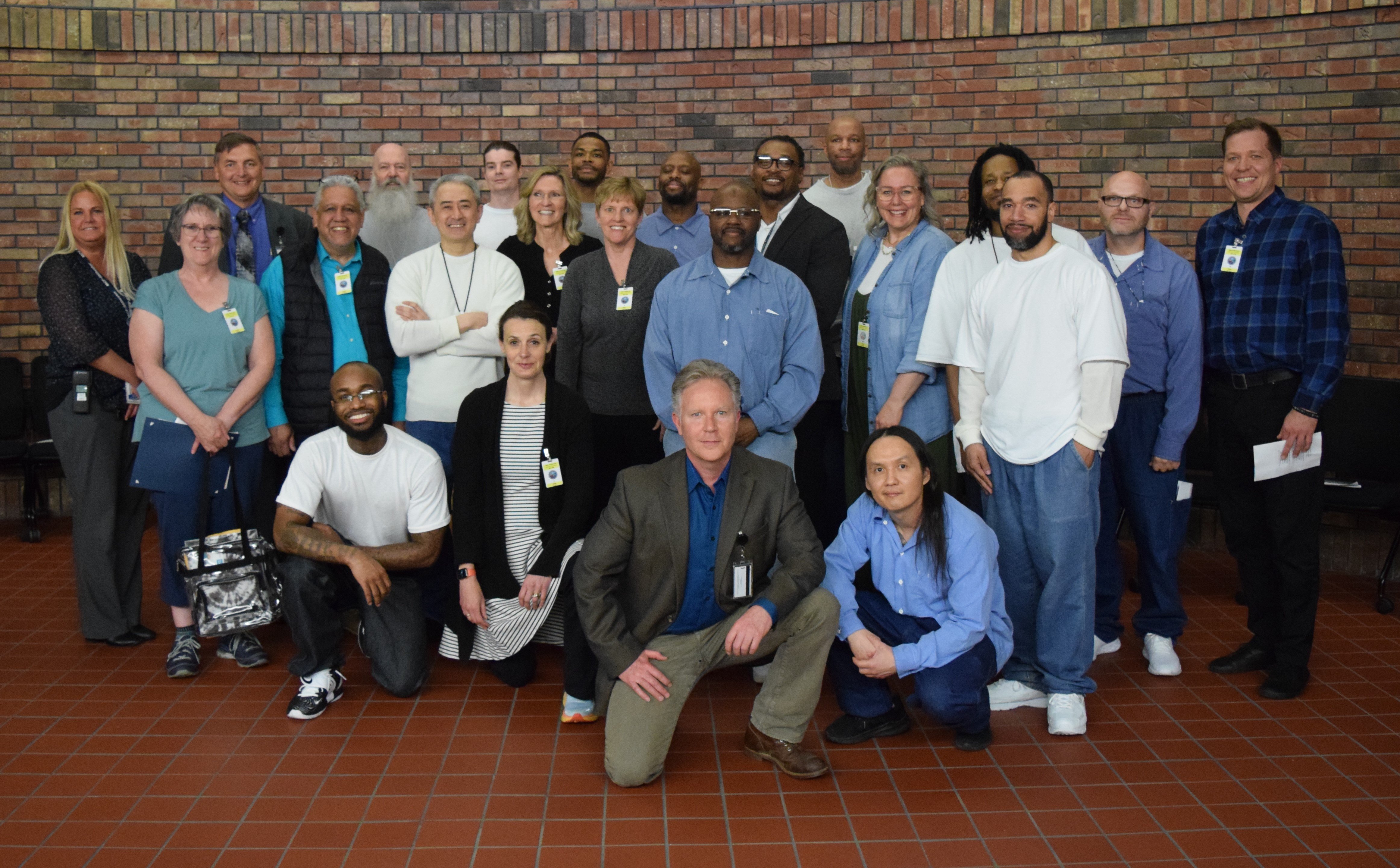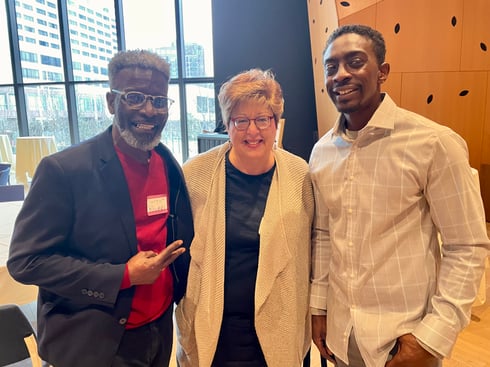
For years, Rev. Dr. Sue Allers Hatlie (’85, ’04) and Rev. Lynda Lee (’14) felt a strong call to work with individuals in prison. For Sue, who grew up as a Missouri Synod Lutheran, ordination in that faith was not possible for women. Lynda was working in tax compliance for a wealth management firm and “drooling” over ARTS: The Arts in Religion and Theological Studies journal founded by Wilson Yates, United’s Distinguished Professor Emeritus of Religion, Society and the Arts. Fortunately, both ended up at United and found the support they needed to become extraordinary prison chaplains.
The Road to United
Sue attended college at Concordia College-Moorhead, a Lutheran-founded liberal arts school in northwestern Minnesota. Her plan was to become a lawyer or probation officer, but she relates that upon graduation, college officials sent her directly to Luther Seminary instead. Sue expressed a desire to become a prison chaplain but was told that could only happen after serving as a congregational pastor.
Frustrated, she stepped away from the seminary and took Clinical Pastoral Education (CPE) classes at the University of Minnesota. While there, a Catholic woman asked Sue if she had ever considered the United Church of Christ or United Theological Seminary of the Twin Cities.
Lynda, who graduated from college with a music degree in piano, was always drawn to creative pursuits. She found out about United through their joint project with Minneapolis Institute of Arts and through the ARTS journal, and immediately felt a kinship with the seminary. She had even started volunteering in prisons, playing music, because she felt compelled to be with the prisoners.
When her friend Patsy Herbert,* another artist, said she was taking classes, Lynda was motivated to enroll. Suddenly it seemed that everything in her life was preparing her for this next challenge. Still, it wasn’t until another good friend—Rev. Dr. Verlyn Hemmen, then director of chaplaincy at Allina Hospital—told her to sit down and fill out the application, that she actually set the wheels in motion to attend United.
Experiences at United
For Sue, United and the UCC opened wide the doors of possibility. United created a formation process that would enable Sue to be ordained and work as a prison chaplain. To satisfy her preference for learning by doing, or contextual education, United approved a plan of independent study.
Sue studied liberation theology with Robert Bryant, Professor Emeritus of Constructive Theology. Professor Bryant took his students on an eye-opening trip to Central and South America, including Mexico, Nicaragua, and El Salvador, where the poverty and oppression mirrors the US “school-to-prison pipeline” for people of color.
Fittingly, Sue’s internship was at Minnesota Correctional Facility (MCF)–Shakopee, an all-women’s prison. Once there, she found a mentor: United alum Carrie Dorfman (’78).* Her next CPE took place at the Hennepin County Home School, a behavioral treatment center in Minnetonka for teens in the juvenile justice system.
Since it took her six years to graduate while balancing full-time work and school, Lynda had a lot of time to explore her interest in art. “Cindi Beth Johnson and Jann Cather Weaver were so good!” Lynda remembers. Through their classes, she learned that art was less a product and more an expression and process. Failure wasn’t an option.
 During her last semester at United, Lynda attended The Christian Church (Disciples of Christ) Ministers Institute where the keynote speaker was Dr. Rita Nakashima Brock. Brock had just published a book with Gabriella Lettini titled Soul Repair: Recovering from Moral Injury after War. The book, in reviewing the care needed for soldiers who sustain moral injury—an overwhelming sense of shame, grief, and remorse for having violated one’s core beliefs—covers narrative therapy and using art as a piece of that.
During her last semester at United, Lynda attended The Christian Church (Disciples of Christ) Ministers Institute where the keynote speaker was Dr. Rita Nakashima Brock. Brock had just published a book with Gabriella Lettini titled Soul Repair: Recovering from Moral Injury after War. The book, in reviewing the care needed for soldiers who sustain moral injury—an overwhelming sense of shame, grief, and remorse for having violated one’s core beliefs—covers narrative therapy and using art as a piece of that.
During Lynda’s CPE placement at St. Francis Regional Medical Center in Shakopee, she connected with an alternative medicine practitioner who taught her to use aroma therapy and guided imagery for self-care. The premise, as Lynda explains, is that these techniques “release the deep care for another’s story that is not mine to hold.” She learned to hold space for a client’s story, without keeping its emotional weight.
The Good Work
While at the Hennepin County Home School, Sue worked to get a chaplain position funded at the Juvenile Detention Center in downtown Minneapolis. As it worked out, Sue was employed by the Greater Minneapolis Council Churches for more than 30 years serving as a chaplain for Hennepin County Adult and Juvenile Corrections.
During that time, she decided to re-launch a CPE program that the county’s correctional system had ended decades earlier. To do that, Sue dual-tracked a DMin at United with the Certified Educator Training through the Association of Clinical Pastoral Education (ACPE).
At United, she worked with Christie Cozad Neuger (’80), United’s Professor Emerita of Pastoral Counseling and Pastoral Theology, to build her practice of using narrative therapy as a foundation for spiritual care and counseling with those who are marginalized. Once a year, from 1998–2010, Sue also studied in person with narrative therapy founders Michael White and David Epston through training offered by Minneapolis psychologist Dr. Walter Bera.
In 1998, Sue began to offer CPE units in correctional settings. Many chaplains in the Minnesota Department of Corrections have completed CPE with her. In 2017, she started to take CPE students into the MCF–Stillwater for a six-week course in Restorative Justice led by incarcerated men serving life sentences.

| Photo from the Spring 2023 CPE Graduation at MCF–Stillwater. |
Two years later, Sue sought funding to allow the incarcerated leaders of the Restorative Justice Council to become CPE students so they could earn master’s level theological education credits and develop their spiritual care skills. Sue’s nonprofit, Social Justice CPE, offers the only units inside prison with incarcerated students in the US. These same students found narrative therapy as a foundation for interfaith spiritual care so life-changing, that many have become adjunct faculty for the Social Justice CPE program.
Lynda retired from her 25-year career in tax compliance in 2014 so she could begin a CPE residency at St. Cloud VA Medical Center the following January. It was there that she developed a specialization in trauma-informed care. Working with veterans in dual diagnosis and PTSD programs, Lynda wrote curricula, curated materials, and facilitated/co-facilitated groups to help individuals deal with inner conflict, self-acceptance, anger management, and image rehearsal therapy (nightmare management).
After completing her clinical residency, job offers came in simultaneously from Allina Health Hospice and the Minnesota Department of Corrections. Once she remembered why she began her seminary journey, Lynda began chaplain work with the Department of Corrections in 2016.
As she explains her choice, “I’m wired to see the underdog and advocate for the underdog, and I understand the oppressor and the oppressed.” She served at MCF-Oak Park Heights and MCF-Stillwater before being called to MCF-Lino Lakes. These days, in addition to providing spiritual care and all religious services, Lynda runs a quarterly grief and loss class for those incarcerated at MCF-Lino Lakes, a unique treatment facility with both medium- and minimum-security housing that also includes opportunities for secondary and higher education.
In working with veterans and incarcerated individuals, Lynda encourages them to identify grief and loss in their life stories. Often trauma occurs in childhood, a time before one has the capacity to make sense of the events in their life. She uses the Internal Family Systems therapy model to identify individuals’ misbeliefs about themselves in a safe and nonjudgmental way so they can embrace those parts with compassion. “Part of the adult waking up,” Lynda explains, “is giving language to the deepest feelings/emotions we have absorbed as children in the midst of trauma.”
 She helps them to understand that the action that resulted in their incarceration was likely a desperate means of survival. At the same time, the action does not have to define them, and it doesn’t mean they are defective. By “peeling back layers” of protective veneer to expose foundational sources of grief and loss, Lynda can validate their pain, guide them to process past trauma, and teach them to feel compassion for their younger selves. She also offers spiritual direction in accord with their identified faith.
She helps them to understand that the action that resulted in their incarceration was likely a desperate means of survival. At the same time, the action does not have to define them, and it doesn’t mean they are defective. By “peeling back layers” of protective veneer to expose foundational sources of grief and loss, Lynda can validate their pain, guide them to process past trauma, and teach them to feel compassion for their younger selves. She also offers spiritual direction in accord with their identified faith.
Restorative Justice
Both Sue and Lynda are committed to Restorative Justice and Liberation Theology. Their beliefs in and practices around trauma-informed care, narrative therapy, and relationship building are a far cry from the prototypically punitive “justice system.” It also offers prison leaders and those who leave prison greater self-awareness and renewed possibilities for hope and purpose.
Wardens at MCF–Stillwater, Sue reports, have recognized that incarcerated individuals who went through the CPE training “make the prisons safer for incarcerated persons and staff.” The 20 trained “spiritual care mentors” (known by other incarcerated men as inmate chaplains) are on call 24–7 and use their well-developed spiritual care skills of de-escalation, conflict mediation, grief and loss processing, and trauma-informed and responsive care.
| Damien, David, and John, three CPE alums, discuss the training and its ongoing impact. |
As Sue shared in a 2022 Social Justice CPE Newsletter, “As the CPE group forms and stories are told with such courage and accountability, there is a relational quality and sacred space that somehow happens. In the outpouring of stories—some horrendously tragic, some so pain-filled—there is yet the sparkle and shimmer of the spirit…the sacred…the light shining through the clouds.” As one of the incarcerated alums said at a Social Justice CPE graduation, “In this dark place, a little light goes a long way; sparking a hope is contagious.”
Lynda also believes that the space she opens up with narrative therapy and internal family systems work can help each prisoner’s “soul spark” in recognition of their “divine self.” There’s a clear value to walking alongside each person, empowering them to be in charge of their own healing. When she helps prisoners prepare for parole hearings, Lynda explains, “we meet to process their life story, as the focus shifts from their crime and rehabilitation…to their inner story of change. My preferred metaphor is using ‘I am’ statements to ‘keep the boat out of the weeds.’ It is profound work to shift from ‘I'm not going to…and I'm no longer’ to ’I am.’”
Gratitude
To secure relevant spiritual resources for those with whom she works, Lynda says, “United continues to offer a deep bench of consults.” Sue asks, “What would I have done without United honoring my deep desire to do this work?” She has won national awards from ACPE for prophetic and innovative leadership.
United is equally grateful for the spiritual dedication with which Sue and Lynda have ministered to those who have been exiled from society. We applaud their work to recognize that all people, regardless of who they are, what they have done, or what they believe, are beloved members of the community.
______
* Deceased



Your Comments :